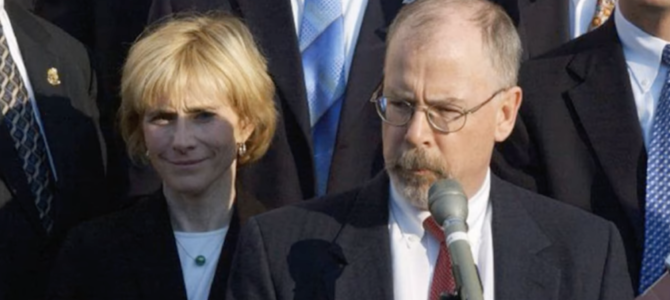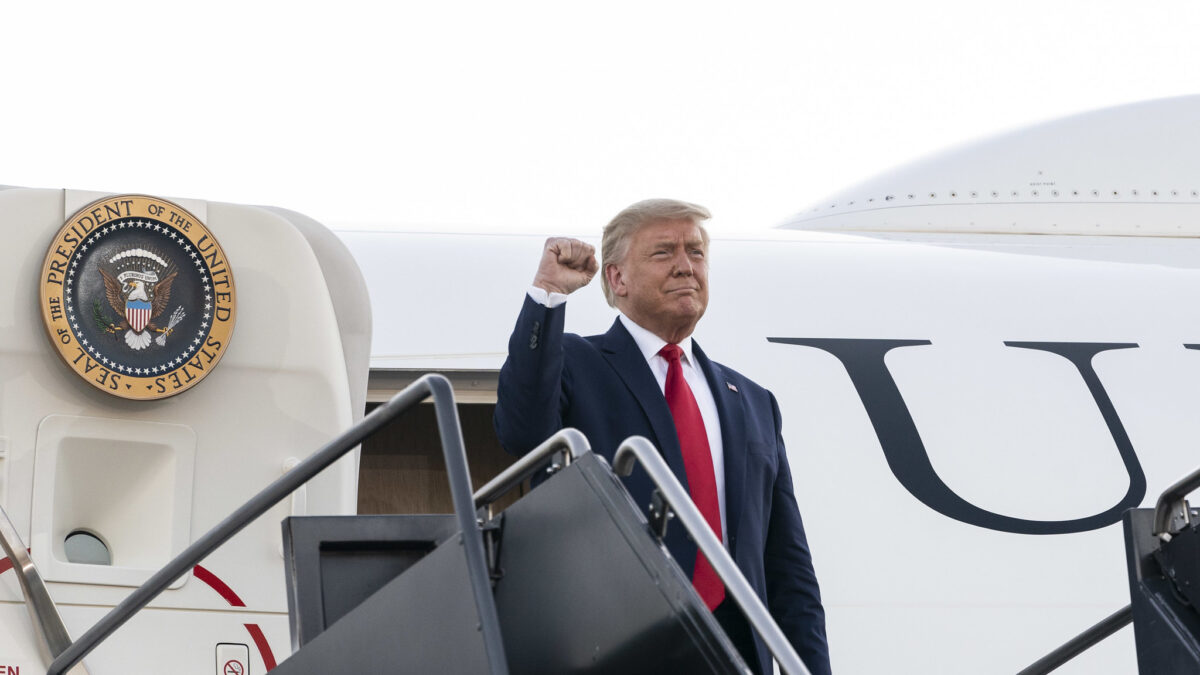
Special Counsel John Durham filed a one-count indictment on Thursday against former Clinton campaign lawyer Michael Sussmann. It charged Sussmann, who had fed the FBI the fake Alfa Bank-Trump conspiracy story, with lying to government agents in violation of 18 U.S.C. § 1001(a)(2).
The details included in the 27-page indictment, however, reveal a scandal much deeper than merely Sussmann’s role in a second Russian hoax — a scandal that entangles the Clinton campaign, multiple internet companies, two federally-funded university researchers, and a complicit media.
While the Steele dossier remains the preeminent source for the Russia-collusion hoax, that was not the Clinton team’s first foray into feeding the media and the FBI false intel on Donald Trump. The Clinton campaign had previously pushed Trump’s supposed “covert communication channel” between the Trump Organization and Alfa Bank.
On October 31, 2016, Slate published a detailed expose on this conspiracy theory, entitled “A Group of Computer Scientists Believes a Trump Server Was Communicating With a Russian Bank.” But Thursday’s indictment now establishes the entire story was a setup from the beginning and the computer scientists were in on the ploy.
“Approximately one week before the 2016 U.S. Presidential election,” the indictment read, “multiple media outlets reported that U.S. government authorities had received and were investigating allegations concerning a purported secret channel of communications between the Trump Organization and Alfa Bank.” According to the articles, an anonymous computer researcher using the name “Tea Leaves” had assembled this evidence, the indictment explained, while in reality, the FBI had initiated an investigation into these allegations in response to a meeting with defendant Michael Sussmann.
During those meetings, Sussmann had provided the FBI general counsel three “white papers,” as well as data files supposedly demonstrating the use of the secret communication channel. Significantly, while meeting with the FBI general counsel, the indictment continued, “Sussmann lied about the capacity in which he was providing the allegations to the FBI.” Sussmann falsely stated that “he was not doing his work on the aforementioned allegations ‘for any client,’” when in fact, he was acting on behalf of “a U.S. technology industry executive at a U.S. Internet company” and “the Hillary Clinton Presidential Campaign.”
That false statement served as the basis for Thursday’s charge of lying to the FBI in violation of 18 U.S.C. § 1001(a)(2). The indictment then summarized substantial evidence supporting the charge.
For instance, while Sussmann told the FBI general counsel he had not assembled the information “for any client,” Sussmann testified under penalty of perjury before the House Permanent Select Committee on Intelligence in December of 2017 that he was acting on behalf of a client when he spoke with the FBI general counsel in September. Sussmann’s billing records also included multiple charges related to the Alfa Bank research, including a bill for his meeting with the FBI general counsel.
After detailing Sussmann’s work for the Clinton Campaign and the false statement he made to the FBI, the indictment highlighted the role several other actors played in feeding the Alfa Bank story to the FBI and the press. Of particular note was the unnamed executive of a U.S. internet company.
“Tech Executive I,” as the indictment branded him, had hired Sussmann as a lawyer and had later told Sussmann he had been promised a top cybersecurity position in the assumed Clinton Administration. “Tech Executive I,” had a business relationship with the individual known as “Tea Leaves” and referred to by the prosecution as “Originator-I,” who had compiled data showing the communications between Alfa Bank and the Trump Organization’s email domain.
According to the indictment, between July and the November election, Sussmann, Tech Executive I, and individuals acting on behalf of the Clinton Campaign, undertook efforts “to share information about the Russian Bank Data with the media and others, claiming that it demonstrated the existence of a secret communications channel between the Trump Organization and Alfa Bank.
During this time period, Tech Executive I “used his access at multiple organizations to gather and mine public and non-public Internet data regarding Trump and his associates, with the goal of creating a ‘narrative’ regarding the candidate’s ties to Russia.” For instance, in August 2016, Tech Executive I “directed and caused employees of two companies in which he had an ownership interest,” identified in the indictment as “Internet Company-2” and “Internet Company-3,” “to search and analyze their holdings of public and non-public internet data for derogatory information on Trump.”
Employees at Internet Company-3 were apparently “uncomfortable regarding this tasking,” believing using the “companies’ data in this manner was inappropriate,” but they nonetheless complied. Accordingly, when Tech Executive-1 emailed a five-page “Trump Associates List,” the employees ran queries on the “non-public Internet data,” comparing it to a lengthy list of Trump associates.
Tech Executive 1 also tasked two university researchers, named generically in the indictment “Researcher-1” and “Researcher-2,” with “search[ing] broadly through Internet data for any information about Trump’s potential ties to Russia. At that time, the university at which the researchers work, was finalizing a federal government contract.”
Researcher-1 and Researcher-2 both worked to locate any connection between Trump and Alfa Bank and in doing so, accessed “data of an Executive Branch office of the U.S. government,” which “Internet Company-I had come to possess as a sub-contractor in a sensitive relationship between the U.S. government and another company.”
Even with access to this sensitive information, however, nothing untoward turned up. And several= email communications between the Tech Executive-1 and the researchers reveal that they all knew there was “no there, there.” “Even if we found” the connections between the servers, there is still no reference to money or evidence of money flowing between the Trump organization and Alfa Bank, one email noted. Originator-1 would then go on to explain how it would be possible to fake a connection between the servers.
But they didn’t need evidence, the emails confirmed. The university researchers and Tech Executive were looking for “anything” that could provide “a basis for closer examination.” All they needed, Tech Executive-1 noted in another email, was something to “give the base of a very useful narrative,” while acknowledging the “trump-email.com” domain, which was the same subject of the allegations Sussmann fed the FBI, “was not a secret communications channel with Russian Bank-1, but ‘a red herring,’” representing legitimate communications for customer relationship companies.
Researcher-I would later share the same sentiments in an email dated August 22, 2016, while also coming clean about their Trump hatred. “Let[‘]s for a moment think of the best case scenario, where we are able to show (somehow)” communications between Trump and Russia, the email read. It continued: “How do we plan to defend against the criticism that this is not spoofed traffic we are observing? There is no answer to that. Let’s assume again that they are not smart enough to refute our ‘best case scenario.’ You do realize that we will have to expose every trick we have in our bag to even make a very weak association.”
“We cannot technically make any claims that would fly public scrutiny,” the email bemoaned, before fessing up: “The only thing that drives us at this point is that we just do not like [Trump]. This will not fly in eyes of public scrutiny. Folks, I am afraid we have tunnel vision. Time to regroup?”
But regroup they didn’t. Instead, Sussmann, Tech Executive-1, Originator-I, and the two university researchers drafted a “white paper” that summarized the Alfa Bank allegations that Sussmann would later hand to the FBI and share with the media. Before doing so, however, the university researchers were asked if the paper would be “plausible” to “security experts,” to which they congratulated their teammates on the “smart” way the paper was drafted to avoid the obvious holes.
Sussmann later shared the white paper with the FBI, while denying his work was on behalf of any client. Sussmann also pushed the story in the media and encouraged Researcher-2 to provide background information to the press.
Following Trump’s election, Sussmann would reach out to another unnamed agency, again pushing the Alfa Bank story, while denying he was working on behalf of any clients in coming forward. And it is for those lies that Sussmann will now stand trial.
While Sussmann’s conduct may have been the only criminal conduct in play, Americans should be outraged by the internet executive’s conduct, and the willingness of two other internet companies to go along with his demands. And Americans should be appalled that university researchers, and now federal-grant recipients, worked to frame a false narrative and accessed sensitive information to do so.
Whether the media will give this story the attention it deserves remains to be seen. But should Sussmann refuse to enter a plea, forcing a trial, the press may have no option but to cover the story.









